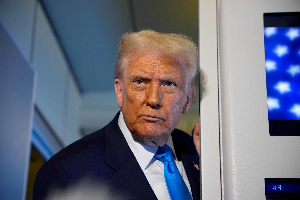Black man’s dilemma. That is the title of a book published in the 1970s that remains one of the most important ever to come out of Nigeria, nay Africa, on the plight of the black man. The challenges and continuing dark portents of the black man’s real or perceived inferiority complex, irresponsibility, industrial scale underachievement, mental slavery and ever increasing backwardness on all fronts was most cerebrally and pungently captured in this book by the recently deceased celebrated journalist turned traditional ruler in Ibadan, the legendary Chief Areoye Oyebola. His submissions are truer today than when they were first penned over five decades ago.
Nothing better exemplifies the continuing pitiable fate of the black man both in his native Africa and in the Diaspora than the tragedy of the still very fresh gruesome daylight murder of a black American, George Floyd, by a white police officer in Minneapolis, the US; an act that still provokes outrage around the world. It is instructive that President Donald Trump, who once derisively dismissed Africa as comprising of shithole countries, is more outraged by the resultant demonstrations and sometimes understandably violent protests spurred by the glaring racist injustice than the barbarity of George Floyd’s fate.
And in Great Britain, his alter ego, Prime Minister Boris Yeltsin, reacting to the pulling down of statutes of ‘illustrious’ slave traders by irate protesters, absolved his country of responsibility for the historic atrocities of slavery, colonialism and neocolonialism and insinuated that re-colonization could even be the best option for the realization of Africa’s trapped potentials.
Despite the excoriations of Trump and Johnson by many indignant Africans, the sad fact is that a not insubstantial number of our fellow country men and women do not fundamentally disagree with the provocative views of these undisguised white supremacists. Africa remains in inexcusably dismal shape nearly six decades after independence. We have achieved Kwame Nkrumah’s fabled political kingdom. But all it has added unto us are ever deepening underdevelopment and immiseration.
I am reminded here, of a very interesting account in Professor Femi Osofisan’s biography of the celebrated poet and dramatist, Professor J.P. Clark, simply titled ‘J.P. Clark, A VOYAGE’. As Features Editor of Chief Olabisi Onabanjo’s newspaper, The Express, J.P. Clark, had been invited to have a working lunch with Chief Obafemi Awolowo who was then the leader of Opposition. Chief Anthony Enahoro and Olabisi Onabanjo were in attendance. At a point during their animated discussion over lunch, J.P Clark pointedly asked Awolowo who he thought the majority of Nigerians would vote for were there to be an electoral contest between the departed colonialists and the post-colonial Nigerian political leaders. This was in 1962, two years after independence.
What was Awolowo’s response? This is how Osofisan reports the incident:
“Awo turned to Enahoro, and said: ‘Tony, answer. If I stood election in Ikenne and you at Uromi against these Oyinbo people tomorrow, who do you think our people will vote for?”
“They will vote for the Oyinbo man!” Tony answered, sadly.
“He was candid”.
“…JP recounts that, for a few minutes after that, the two older men just sat there, looking very dejected.”
In his last testament, ‘There was a Country’, Chinua Achebe enthused nostalgically about a functional and efficient Nigeria that once was under British colonialism. Let me crave the reader’s indulgence here. I will quote portions of Awo’s prescient thoughts at some length in this piece. All too often, even professed and ardent Awoists introduce a misleading sort of sectional reductionism into his political thought and praxis. He is portrayed essentially as a Yoruba nationalist who was a foremost advocate of federalism as a vehicle for promoting the interest of Western Nigeria in the Nigerian federation.
Awo was persuaded as to the suitability of federalism as the best constitutional arrangement for Nigeria by the thought of Pandhit Nehru and the successful application of federal practice in India, which had a polity no less complex and plural than Nigeria. But of greater centrality in Awo’s political thought was his rigorously articulated ideology of democratic socialism, which espoused the all round development of man, irrespective of ethno-regional origin or religious faith, through affordable education, healthcare, full employment and intense infrastructural development across diverse sectors.
This was his dream not just for Western Nigeria, where he provided outstanding leadership in government for eight years. Were he as insular and narrow in focus as often portrayed, Awo would have been content to stay on as Premier of the Western Region. Rather, he sought to actualize for Nigeria as a whole the near superhuman feats of his government in the Western Region.
His dream of the accelerated agricultural, industrial, social welfare and technological transformation of Nigeria was driven by Awo’s acute perception of the historic and manifest destiny of Nigeria as the catalyst for the emancipation of the black man everywhere and the redressing of the injustices the race had suffered across time and space. Let me demonstrate my argument.
On 28th June, 1961, Awolowo had issued a press statement on behalf of the Action Group (AG) titled ‘African Unity is a necessity’. He stated: “From the beginning of recorded history, the black man has been the most conspicuous butt of all manner of inhuman treatment. In the palaces of the Arabian potentates – both in the Middle East and in North Africa – he was degraded and enslaved. When the so-called ‘Dark Continent of Africa’ was discovered, the European marauders hunted him down like a common beast, captured him, and sold him into slavery in the Americas and the West Indies”.
He continued, “The era of trading in, and of enforcing the services of black slaves, was terminated only to be replaced by the European Powers which initiated it with a legalized form of political and economic enslavement of the entire black peoples of the continent of Africa…Today, for most parts of black Africa, the inhumane, humiliating and degrading position delineated above remains more or less the same”.
And in his closing address to the fifth session of the Organization of African Unity (OAU) in Algiers on Monday, 16th September, 1968, Awolowo as the head of the Nigerian delegation, noted that: “In the USA, the Negro Americans suffer grave social disabilities, so much so that there are now clear signs that the recent violent rioting by the Negroes may degenerate into civil war between White and Black Americans”. The ongoing George Floyd saga shows that as it was then, so it remains now.
Back to his 1961 statement I referred to earlier, Awolowo said, “The emergence of Nigeria as an independent nation was hailed as an event of exceedingly favourable portent for Africa. In size, population, and natural resources, Nigeria is indisputably a giant in Africa…The high hopes which were cherished in Nigeria as an unassailable bastion in the last phase of Africa’s struggle against colonialism and neo-colonialism of whatever nature and guise are fast receding. Among true African nationalists, Nigeria as at present led by our government, is thoroughly suspect and does not enjoy the respect and confidence to which she is entitled by virtue of her natural potentialities”. As it was then, so it remains today if things are not even far worse.
The golden age of Nigeria’s foreign policy when she boldly championed the cause of Africa’s emancipation during the Murtala/Obasano regime, lies in the remote past. The country lies economically prostrate and her foreign policy pathetically enfeebled by years of dedicated and diligent looting of the national treasury by a venal political class. It is instructive that the Nigerian government could not even manage a symbolic whimper on the George Floyd tragedy. Unlike Awo, Nigeria’s leadership in this dispensation cannot see the vital linkage between the country’s greatness and the historic redemption of the black man.
Opinions of Saturday, 4 July 2020
Columnist: The Nation
Black man's dilemma
Business














